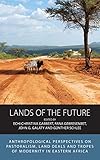Lands of the Future : Anthropological Perspectives on Pastoralism, Land Deals and Tropes of Modernity in Eastern Africa / ed. by John G. Galaty, Günther Schlee, Echi Christina Gabbert, Fana Gebresenbet.
Material type: TextSeries: Integration and Conflict Studies ; 23Publisher: New York ; Oxford : Berghahn Books, [2021]Copyright date: ©2021Description: 1 online resource (396 p.)Content type:
TextSeries: Integration and Conflict Studies ; 23Publisher: New York ; Oxford : Berghahn Books, [2021]Copyright date: ©2021Description: 1 online resource (396 p.)Content type: - 9781789209907
- 9781789209914
- HD978.Z7
- online - DeGruyter
| Item type | Current library | Call number | URL | Status | Notes | Barcode | |
|---|---|---|---|---|---|---|---|
 eBook
eBook
|
Biblioteca "Angelicum" Pont. Univ. S.Tommaso d'Aquino Nuvola online | online - DeGruyter (Browse shelf(Opens below)) | Online access | Not for loan (Accesso limitato) | Accesso per gli utenti autorizzati / Access for authorized users | (dgr)9781789209914 |
Frontmatter -- Contents -- Illustrations -- Acknowledgements -- Abbreviations -- Introduction. Futuremaking with Pastoralists -- Part I Setting the Context Modernity and Citizenship in Pastoral Areas -- Chapter 1 Modern Mobility in East Africa Pastoral Responses to Rangeland Fragmentation, Enclosure and Settlement -- Chapter 2 Unequal Citizenship and One-Sided Communication Anthropological Perspectives on Collective Identification in the Context of Large-Scale Land Transfers in Ethiopia -- Chapter 3 Global Trade, Local Realities. Why African States Undervalue Pastoralism -- Part II Contested Identities and Territories A History of Expropriation -- Chapter 4 Modes of Dispossession of Indigenous Lands and Territories in Africa -- Chapter 5 Land and the State in Ethiopia -- Chapter 6 Persistent Expropriation of Pastoral Lands The Afar Case -- Part III Power, Politics and Reactions to State-Building -- Chapter 7 Anatomy of a White Elephant Investment Failure and Land Confl icts on Ethiopia’s Oromia–Somali Frontier -- C hapter 8 From Cattle Herding to Charcoal Burning Land Expropriation, State Consolidation and Livelihood Changes in Abaya Valley, Southern Ethiopia -- Chapter 9 Villagization in Ethiopia’s Lowlands Development vs. Facilitating Control and Dispossession -- Part IV Underdeveloping South Omo -- Chapter 10 ‘Breaking Every Rule in the Book’ Th e Story of River Basin Development in Ethiopia’s Omo Valley -- Chapter 11 State-Building in the Ethiopian South-Western Lowlands Experiencing the Brunt of State Power in Mela -- Chapter 12 Customary Land Use and Local Consent Practices in Mun (Mursi) A New Call for Meaningful FPIC Standards in Southern Ethiopia -- Chapter 13 Ethiopia’s ‘Blue Oil’? Hydropower, Irrigation and Development in the Omo-Turkana Basin -- Conclusion Pastoralists for Future -- Glossary -- Index
restricted access online access with authorization star
http://purl.org/coar/access_right/c_16ec
Rangeland, forests and riverine landscapes of pastoral communities in Eastern Africa are increasingly under threat. Abetted by states who think that outsiders can better use the lands than the people who have lived there for centuries, outside commercial interests have displaced indigenous dwellers from pastoral territories. This volume presents case studies from Eastern Africa, based on long-term field research, that vividly illustrate the struggles and strategies of those who face dispossession and also discredit ideological false modernist tropes like ‘backwardness’ and ‘primitiveness’.
Mode of access: Internet via World Wide Web.
In English.
Description based on online resource; title from PDF title page (publisher's Web site, viewed 25. Jun 2024)


